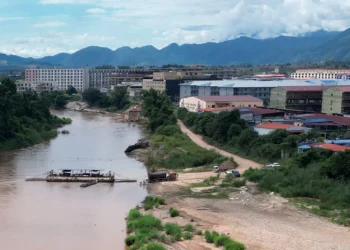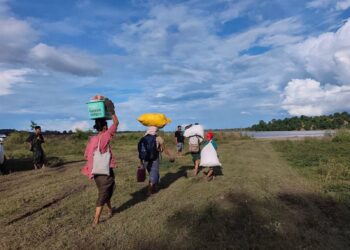The Cobra Column resistance group is integrating defectors from the Myanmar military into its ranks, while prisoners of war are put to work at a camp in Kayin State.
By MOE THAW DAR SWE | FRONTIER
In December last year, Staff Sergeant Ko Aung Yin decided to leave the military after more than two decades of service. Worried about his safety after criticising the widespread use of metamphetamines among his fellow soldiers, he defected to the Cobra Column, an armed resistance group under the command of the Karen National Liberation Army in Kayin State.
“I hate drugs more than anything, but the officers only care about money. They just want their families to be financially comfortable, so they buy drugs and sell them to soldiers,” he told Frontier at a KNLA camp in February, using a pseudonym for safety reasons.
Aung Yin joined the army when he was 18 and over the years rose to the rank of sergeant and battalion aide. In July last year he was assigned to the Aung Zeya column, assembled in April in an ultimately failed bid to retake a stretch of Asian Highway 1 between Kawkareik and Myawaddy town in Kayin from KNLA-led forces.
Aung Yin claimed that the captain of his battalion under the Aung Zeya column collaborated with other officers in distributing metamphetamines to the soldiers.
“The soldiers in my squad were becoming disoriented, and they didn’t want to work anymore. When I discovered it was because of drugs and where they got them from, I was very upset,” he said.
When he tried to stop the distribution of metamphetamines, he realised he was being watched by the officers implicated in the drug network and that his life was in danger.
That’s when he decided to defect.
“They warned us not to run away, saying that if we defected, the resistance would kill us. But a person only dies once, so I made my escape. My experience with defecting was very different from what they said it would be,” Aung Yin said.
Frontier could not independently verify his backstory, or those of other defectors as well as prisoners, who are all referred to in this article by pseudonyms for protection. However, Aung Yin and another former staff sergeant were observed supervising the various defectors who have been integrated into the Cobra Column. They coordinate personnel rotations between the front lines and rearward rest areas, while also organising activities like farming or collecting firewood for cooking during non-combat periods.
Aung Yin also helps the Cobra Column at the front lines by defusing junta landmines and replanting them to defend resistance forces against the military’s attacks. “I’m good with the military’s mines. I’ve worked with revolutionary comrades planting and defusing mines three or four times,” he said.
The former sergeant has gained the trust of the Cobra Column, and he said he will fight against the military from now on as a member of the resistance.
“I’m going to try and call all the troops in my unit to join the revolutionary forces. Nobody wants to stay in the military. They’re still young and they still can live freely outside if they want. The military has lost its strength,” he said.
‘I owe my life to them’
Since defecting, Aung Yin has lived in a camp that hosts about 100 defectors and prisoners of war. Most of them belonged to the Aung Zeya column and say they were originally conscripts drafted under the People’s Military Service Law, which the junta activated in February last year after decades lying dormant on the books. Many of them have now chosen to fight against the military.
Frontier visited the camp in February, on the condition of not disclosing its location for fear of regime airstrikes. There we witnessed the KNLA distributing weapons, bulletproof vests and helmets emblazoned with the Karen armed group’s logo to the defectors.
“They can join the resistance and they are treated as our comrades. If they don’t want to stay here and want to work outside, we arrange for them to go to Thailand for work,” said Ko Bone Kyway, a KNLA officer in charge of the camp.
According to him, about 70 men have fled from the Aung Zeya column and joined his troops.
Accepting defectors is not without its dangers because they’re given phones and internet access, through which they could potentially pass on intelligence to the military. “If just one person betrays us, everyone will be lost,” Bone Kyway said. However, he argued that turning enemies into allies is beneficial for the long-term goal of overthrowing the junta.
Ko Yan Lay is another soldier who defected from the Aung Zeya column.
Yan Lay, who is in his early 20s, says he was detained by the regime in August last year when he arrived at Mandalay’s central railway station from Yangon to work at a hotel in the city. He is Rakhine, and his ethnicity as shown in his ID card immediately put him under suspicion of being a member or supporter of the Arakan Army, which has been fighting the military in Rakhine State for years.
He was conscripted and sent to Shan State, where he underwent training for three months. From there he was sent to Kayin, where he defected along with two other soldiers to the Cobra Column in December.
Yan Lay brought his weapon and ammunition with him, for which the Cobra Column gave him K3 million (about US$680 at the market rate) as a reward. It also offered him the chance to go to the Thai border town of Mae Sot, opposite Myawaddy, but he decided to stay and join the resistance.
“They could have killed me as an enemy because I was in the military, but they didn’t. I owe my life to them,” he said.
He would like to contact the AA to fight the regime in Rakhine but said he will stay in Kayin. “If I fight in Rakhine, it’s against the military. If I fight here, it’s against the same military. The most important thing is to have a revolutionary spirit,” he said.
‘I’m afraid to go back’
Meanwhile, a small number of POWs have opened their own businesses, mostly restaurants and coal ovens, in a village near the camp.
One of them is former Lance Corporal Zeyar, from the Kayin capital of Hpa-an, who after two decades in the army was taken prisoner in April last year during a battle in Myawaddy Township.
“I was afraid when I was arrested. At first I wondered when I would be executed because I had heard that captured people were not kept alive,” he told Frontier.
Instead of being executed, he was kept as a POW for several months. When he was released in November, he asked his wife to bring their two children who were staying with her parents in Mon State. When they arrived he opened a restaurant in the village.
“I’m afraid to go back because I will encounter the military sooner or later. I don’t know what punishment I would face, but I’ve heard that they would send us to duty again,” he said.
Other POWs are put to work at the camp.
One of them is Ko Bo Bo, a young man who says he was conscripted last year at his village in rural Nay Pyi Taw. He served at Light Infantry Battalion 97 with the Aung Zeya column and now mostly works at the camp kitchen.
Bo Bo used to work collecting coconuts in his village. He suffers from epilepsy and has severe problems with short and long-term memory.
“Whenever I went into the forest and hid knives or sandals somewhere along the way, I wouldn’t remember where they were on my return,” he told Frontier of his former village life.
Despite his condition, community leaders urged him to volunteer as a conscript to help meet the village’s conscription quota. “They said they would collect K1.5 million in the village to pay me to join,” he explained, adding he eventually received only K400,000. He did not meet the medical standards but the army recruited him anyway to do menial labour on the front lines.
He underwent basic military training in Nay Pyi Taw, where he was frequently punished for his memory lapses. After the training he was sent to Kayin, where he was assigned to deliver food packages to frontline soldiers, but he got lost several times.
“I didn’t remember the roads. I kept coming back to where I started from,” he said.
After he got lost three times, his superiors assigned another soldier to accompany him, but during another food delivery attempt in December last year he got lost again and inadvertently stumbled upon a position held by the KNLA.
“I heard voices and they waved at me. I thought they were our soldiers, but when I went to them and put down the food packages I realised they weren’t my men. Then they made me kneel and handcuffed me,” Bo Bo said.
As a POW, he was sentenced by the Cobra Column to one year of labour, serving mostly as a cook. He hopes he can return to his home village after his sentence is completed, but claims not to mind his present conditions.
“Here I feel more free than in the military,” he said. “Things are less difficult here. I won’t ever return to the military.”






